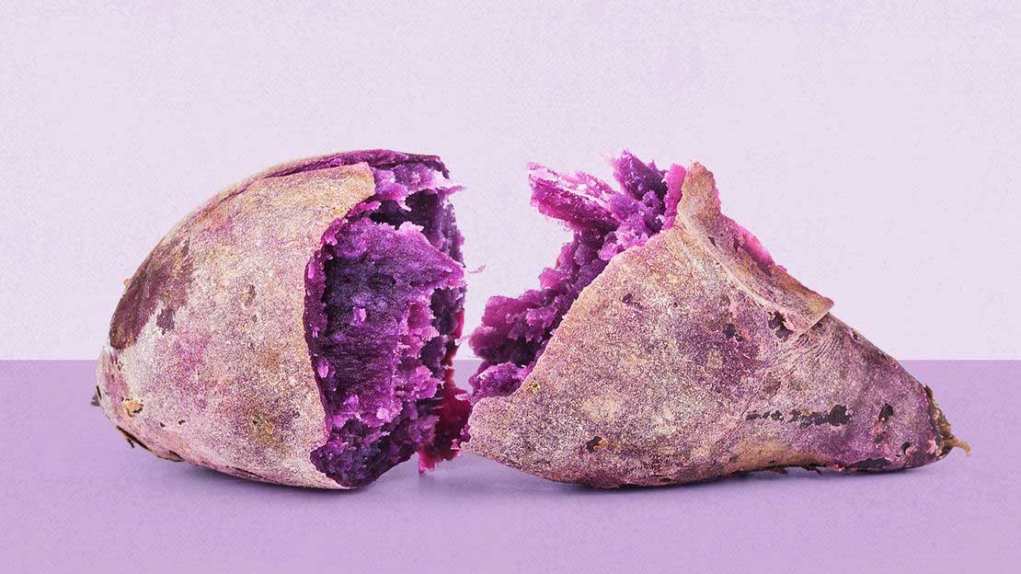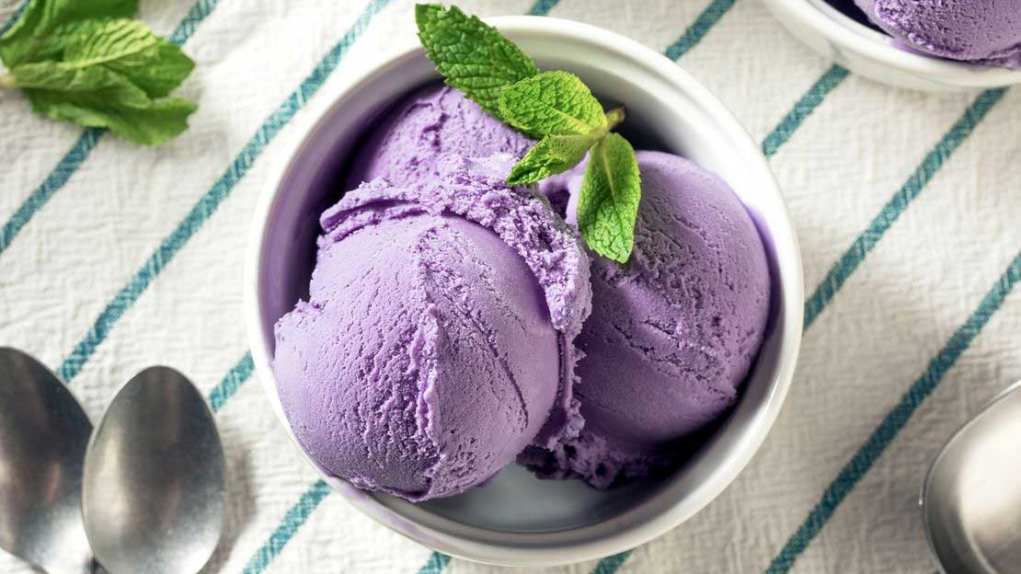
With its vibrant purple flesh and versatile function, ube seems like a vegetable made for social media. It’s no wonder the two-syllable tuber (pronounced “oo-beh”) is catching eyes there: On TikTok #ube has garnered more than 246 million views, and on Instagram #ube appears on more than 532,000 posts and counting.
What Is Ube, Anyway?
Ube is a purple root vegetable that was first grown in Southeast Asia, and people often refer to it as a purple yam — which is different from a purple sweet potato, according to the Philippine Consulate General in Vancouver, British Columbia, Canada, and Frieda’s Branded Produce. A potential reason ube has gained popularity is its stunning purple color.
How Healthy Is Ube?
Like other veggies, ube is good for you because it’s packed with nutrients. In fact, ube gets its bright purple color from anthocyanins, a group of powerful antioxidants that may help reduce inflammation and the risk of certain cancers, according to past research (PDF).
Ube (Purple Yams) vs. Purple Sweet Potatoes
While ube and purple sweet potatoes are different botanically and have different skin as a result, nutritionally they’re similar.
Ube Nutrition Facts
According to the U.S. Department of Agriculture, in 3.5 ounce (oz) of ube, there are:
- 120 calories
- 1 grams (g) protein
- 0g fat
- 27g carbohydrates
- 10 milligrams (mg) sodium
- 4g fiber (a good source)
- 12mg vitamin C (a good source)
Purple Sweet Potatoes Nutrition Facts
Like ube, purple sweet potatoes are a rich source of antioxidants and fiber.
According to data from Food Processor (a nutritional database), you’ll find the following in a 3.5-oz serving:
- 114 calories
- 2g protein
- 0g fat
- 25g carbohydrates
- 0mg sodium
- 5g fiber (a good source)
- 5mg vitamin C (a good source)
Nutritionally and aesthetically speaking, purple sweet potatoes can make the perfect bright purple substitute for ube in any recipe.
Are Ube Products Healthy?
If you’ve walked into a grocery store or been on social media, you know ube comes in many forms. Keep in mind that just because something has the word slapped on the label that doesn’t mean it offers the aforementioned beneficial nutrients.
For example, you may think cooking with ube extract, which you can buy online or in an Asian market, is a smart move nutritionally, but that isn’t true. Most often, you add the ingredient (which is itself just sugar and flavoring) to recipes for high-sugar, high-fat foods like donuts and ice cream (two popular ube foods on social media).
Although nutrition facts will vary by product and recipe, here are two examples:
Trader Joe’s Ube Ice Cream Nutrition Facts
Here’s what you get from one 2/3-cup serving of Trader Joe’s Ube Ice Cream:
- 200 calories
- 4g protein
- 11g fat
- 7g saturated fat
- 22g carbohydrates
- 16g added sugar
- 75mg sodium
- Less than 1g fiber
A homemade ube ice cream recipe from The Spruce Eats would be an even bigger indulgence, at 262 calories and 19 g fat (12 g from unhealthy saturated fat), and 21 g sugar per ½-cup serving.
Homemade Ube Doughnut Nutrition Facts
And here’s an example of a recipe for ube doughnuts via the blog Aubrey’s Kitchen:
- 255 calories
- 3g protein
- 7g fat
- 3g saturated fat
- 45g carbohydrates
- 28g sugar
- 280mg sodium
- 1g fiber
- 1mg vitamin C
What Does Ube Taste Like?
Some people describe ube as sweet and creamy with nutty and vanilla-like undertones, according to Real Simple.
What if You Can’t Find Ube?
If you can’t find the whole, nutritious form of ube in your local grocery store, you’re not alone. According to Frieda’s Branded Produce, fresh ube is rarely available in the United States. It can be difficult to source and, even if you do find it, there’s a fair chance that it’s a mislabeled purple sweet potato. Produce managers often confuse the two and it’s even possible that many are playing into the current popularity of ube.
A Healthy Ube Ice Cream Recipe
This ube “nice cream” is sweet, beautiful, and delicious. If you can’t find ube in your hometown, not to worry — a purple sweet potato makes the perfect stand-in without sacrificing on nutrition.
Cooking and then cooling the ube will cause it to contain resistant starch which may help with blood sugar control and weight loss, according to Johns Hopkins University, making this healthy ube ice cream that much better for you!
Serves 4

Ingredients
- 3 ripe bananas
- 1 small ube or purple sweet potato
- ⅓ cup unsweetened plain soy milk or milk of your choice, plus more as needed
Directions
- Slice bananas into pieces and place in a bag in the freezer.
- Meanwhile, use a fork to poke holes all over the ube. Place the ube in the microwave and microwave until a knife can easily pierce the flesh, about 5 to 6 minutes, turning over halfway through. Once the ube is cooked, place it in the refrigerator to cool completely.
- When the ube is completely cooled, slice it in half and scoop the flesh into a blender or food processor. Add the frozen banana slices and soy milk and blend until smooth, adding more soy milk, as needed, to adjust the consistency. Enjoy immediately or place in the freezer until serving.
Nutrition per serving: 103 calories, 1g total fat (0.1g saturated fat), 2g protein, 24g carbohydrates, 2.8g fiber, 11g sugar (0g added sugar), 8mg sodium
Important Notice: This article was originally published at www.everydayhealth.com by Kelly Kennedy, RDN where all credits are due. Medically reviewed by Lynn Grieger, RDN, CDCES.
Disclaimer
The watching, interacting, and participation of any kind with anything on this page does not constitute or initiate a doctor-patient relationship with Dr. Farrah™. None of the statements here have been evaluated by the Food and Drug Administration (FDA). The products of Dr. Farrah™ are not intended to diagnose, treat, cure, or prevent any disease. The information being provided should only be considered for education and entertainment purposes only. If you feel that anything you see or hear may be of value to you on this page or on any other medium of any kind associated with, showing, or quoting anything relating to Dr. Farrah™ in any way at any time, you are encouraged to and agree to consult with a licensed healthcare professional in your area to discuss it. If you feel that you’re having a healthcare emergency, seek medical attention immediately. The views expressed here are simply either the views and opinions of Dr. Farrah™ or others appearing and are protected under the first amendment.
Dr. Farrah™ is a highly experienced Licensed Medical Doctor certified in evidence-based clinical nutrition, not some enthusiast, formulator, or medium promoting the wild and unrestrained use of nutrition products for health issues without clinical experience and scientific evidence of therapeutic benefit. Dr. Farrah™ has personally and keenly studied everything she recommends, and more importantly, she’s closely observed the reactions and results in a clinical setting countless times over the course of her career involving the treatment of over 150,000 patients.
Dr. Farrah™ promotes evidence-based natural approaches to health, which means integrating her individual scientific and clinical expertise with the best available external clinical evidence from systematic research. By individual clinical expertise, I refer to the proficiency and judgment that individual clinicians acquire through clinical experience and clinical practice.
Dr. Farrah™ does not make any representation or warranties with respect to the accuracy, applicability, fitness, or completeness of any multimedia content provided. Dr. Farrah™ does not warrant the performance, effectiveness, or applicability of any sites listed, linked, or referenced to, in, or by any multimedia content.
To be clear, the multimedia content is not intended to be a substitute for professional medical advice, diagnosis, or treatment. Always seek the advice of your physician or other qualified health providers with any questions you may have regarding a medical condition. Never disregard professional medical advice or delay in seeking it because of something you have read or seen in any website, video, image, or media of any kind. Dr. Farrah™ hereby disclaims any and all liability to any party for any direct, indirect, implied, punitive, special, incidental, or other consequential damages arising directly or indirectly from any use of the content, which is provided as is, and without warranties.








